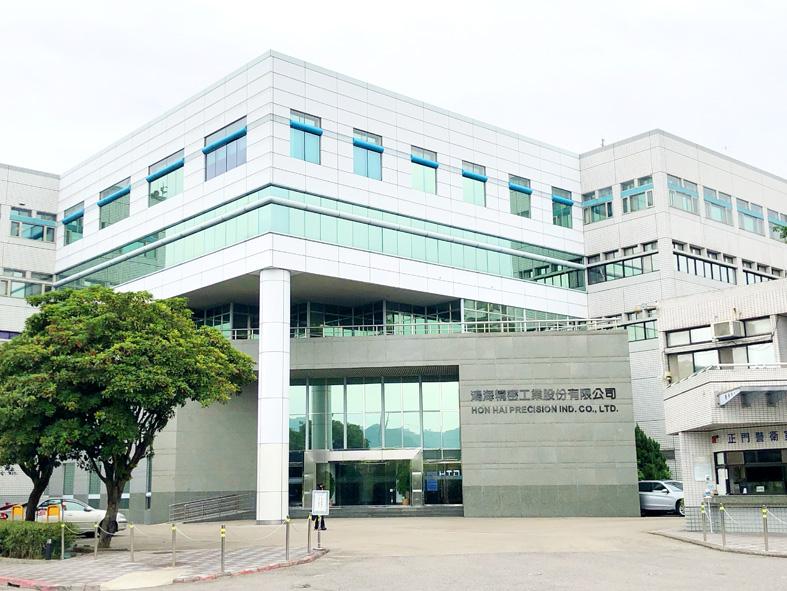Hon Hai Precision Industry Co (鴻海精密), which assembles Apple Inc’s iPads and iPhones, yesterday reported that its consolidated revenue last month was the highest in 11 months and had increased 12.86 percent from a month earlier.
Revenue was NT$621.71 billion (US$22.43 billion), up from NT$550.89 billion in October, the company said in a statement.
Last month’s results were in line with market expectations, as the company was gearing up to assemble new iPhone models and other electronics for the year-end shopping season.

Photo: Fang Wei-jie, Taipei Times
Hon Hai is a leading electronics manufacturing service company that primarily manufactures computer hardware, handsets and networking products for major global brands. It has four main business divisions: consumer and intelligent electronics, cloud and networking technology, computing products and components.
Compared with October, Hon Hai said it benefited from robust business at its components division, followed by its consumer and intelligent electronics division, its computing products division and then its cloud and networking businesses.
On an annual basis, revenue was down 8.76 percent, Hon Hai said, adding that its components division reported the highest sales growth, ahead of the cloud and networking, computing products and consumer and intelligent electronics divisions.
The company’s revenue for last month was the second highest on record for November, Hon Hai data showed.
For the first 11 months of the year, revenue totaled NT$5.28 trillion, up 13.67 percent from NT$4.64 trillion in the same period last year and the highest on record for the period.
Last week, Bloomberg News reported that Apple had told suppliers that demand for the iPhone 13 lineup had slowed, suggesting that interest among consumers for new iPhones is declining, which could affect the US company’s suppliers in Asia.
For Hon Hai, uncertainties from tight component supply and the COVID-19 pandemic to competition from Chinese peers would remain in the near term, analysts said.
While the company has been developing electric vehicle, robot and digital healthcare businesses as potential revenue drivers, their contributions would initially be limited because of low order visibility and Hon Hai’s huge sales scale, analysts said.

South Korea’s equity benchmark yesterday crossed a new milestone just a month after surpassing the once-unthinkable 5,000 mark as surging global memory demand powers the country’s biggest chipmakers. The KOSPI advanced as much as 2.6 percent to a record 6,123, with Samsung Electronics Co and SK Hynix Inc each gaining more than 2 percent. With the benchmark now up 45 percent this year, South Korea’s stock market capitalization has also moved past France’s, following last month’s overtaking of Germany’s. Long overlooked by foreign funds, despite being undervalued, South Korean stocks have now emerged as clear winners in the global market. The so-called “artificial intelligence

‘SEISMIC SHIFT’: The researcher forecast there would be about 1.1 billion mobile shipments this year, down from 1.26 billion the prior year and erasing years of gains The global smartphone market is expected to contract 12.9 percent this year due to the unprecedented memorychip shortage, marking “a crisis like no other,” researcher International Data Corp (IDC) said. The new forecast, a dramatic revision down from earlier estimates, gives the latest accounting of the ongoing memory crunch that is affecting every corner of the electronics industry. The demand for advanced memory to power artificial intelligence (AI) tasks has drained global supply until well into next year and jeopardizes the business model of many smartphone makers. IDC forecast about 1.1 billion mobile shipments this year, down from 1.26 billion the prior

Chinese artificial intelligence (AI) start-up DeepSeek’s (深度求索) latest AI model, set to be released as soon as next week, was trained on Nvidia Corp’s most advanced AI chip, the Blackwell, a senior official of US President Donald Trump’s administration said on Monday, in what could represent a violation of US export controls. The US believes DeepSeek will remove the technical indicators that might reveal its use of American AI chips, the official said, adding that the Blackwells are likely clustered at its data center in Inner Mongolia, an autonomous region of China. The person declined to say how the US government received

People stand in a Pokemon store in Tokyo on Thursday. One of the world highest-grossing franchises is celebrated its 30th anniversary yesterday.